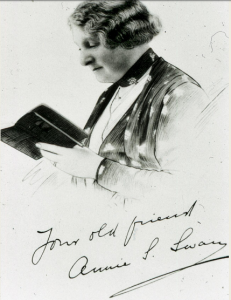
Introduction
That Annie S. Swan (1859-1943) is not widely recognised as a major player in Scottish social, political and cultural history is perhaps a reflection of an historic, academic bias towards the contribution of woman in the literary and political sphere of the late nineteenth and early twentieth century’s. Indeed, that a town such as Gorebridge is largely unaware of the mass popularity of written work which was conceived here acts as an indication of the extent to which her name continues to slip into obscurity.
What follows will briefly chart the fascinating life of a woman whose pen would reach and enthrall the minds of thousands of readers, be one of the first female candidates in Scotland for Parliament, and the only female founder of the Scottish National Party.
[su_box title=”Annie Swan” box_color=”#a9aba9″]’Let them go to the mills of Dundee, the tenements of Glasgow, the fishermen’s rows in their fishing villages, to the Scottish Dominions oversees – they would find “Annie S. Swan’s” name a household word. If they sought for another person who had such a tenacious and powerful hold over the Scottish public, they could not find it in the world of literature.’ Edward Albert, quoted in Scotsman 10/01/1935[/su_box]
Youth, Family and Gorebridge
It was not until her formative years that Annie Swan and her family took up permanent residence at Mountskip Farm, Gorebridge. One of seven siblings, born of a religious father who worked the land and had a ‘high and passionate temper’ and a mother who was ‘gentle, generous [and] charitable…who judged nobody and had compassion and gentle kindness for all’, Annie speaks of a childhood which was at once remote from common social interaction, and yet full of memories of a close knit family group. Of staying in ‘the country’ she reminisces:
the farms were isolated….my father did not approve of diversions of any kind. He discouraged young people about the house because they interrupted the daily and hourly routine. Nor had we many amusements. A very rare tea or supper party at some neighbour’s house, a kirk social or soiree, or a concert or penny reading in the village school comprised the sum-total.
It is easy to understand this feeling of isolation from the local community. Mountskip Farm, Annie and her family’s permanent residence during their stay in Gorebridge, lies at the periphery of the town, just under two miles from Gorebridge Main Street. Furthermore, the family were not in fact educated in the village. Annie was schooled at a Dame’s School at Haddington Place, Edinburgh (leaving the children to walk to the train station at the crack of dawn every morning to make it into the city). Annie’s life in Gorebridge was not without its sadness. In her autobiography she speaks frankly of the death of her mother (to whom her well received ‘Carlowrie’ is dedicated) in her typically quaint way:
My brother Alec returned from a visit to the Channel Islands carrying the seeds of typhoid fever. He was violently ill for many weeks, and several of us had mild attacks. Before he was quite convalescent, my mother, worn out with nursing and anxiety, succumbed. She died on the night of the great storm, October 13, 1881, which wrought such havoc on land and sea, destroying the major portion of the Eyemouth fishing fleet. It was a black day for thousands in Scotland. For us it meant the break up, in fact the end, of the life we had known.
The death of her mother seems to have had a major impact on the family dynamic.
It is clear that Annie and her siblings never took to their stepmother, with whom her father quickly became acquainted. ‘Pious, rigid and narrow-minded’ were but a few of the ways in which she perceived her step-mother, who had subdued and possibly even bullied her father to the extent to which she began to view him as ‘pathetic’. Swan was nonetheless pleased to discover that, upon his death, her mother’s name, and not that of her stepmother, was on the lips of her father, writing: ‘The dominator apparently was not able to dominate the inner citadel of his heart.’ Truly then, the death did act as the breakup of the family. Whether Swan’s discontent of her stepmother is purely the invention and grief of a young woman who lost her dear mother is unclear. Regardless, it was with some haste that at this time, at the age of 24, Annie Swan would marry school teacher and aspiring doctor James Burnett-Smith leaving the farm at Mountskip, only to return sporadically through her life until her father would pass away.
Early Work and Successes
Annie’s first experience of publication was with the small, and possibly suspect Charing Cross Publishing Company. As part of the book deal, she had to pay her own share of the production – her father advanced the £50 which they would never make back upon the half-profit system which the company operated. The novel, Ups and Downs did receive favourable reviews, including one in the respected literary magazine of the day the Athenaeum. Her father’s displeasure at having lost his investment did not deter the aspiring author and she continued, away from his eyes, contributing articles to the religious literary paper Christian Leader.
During this time, and although she never received a penny for her endeavours, Annie would be eternally grateful to its editor, Rev. Howie Wylie, for the opportunity to ‘express myself’ and the ‘wise and valuable counsel’ which he offered. It would be at this time that Annie would begin work on her most popular and commercially successful novel, Aldersyde. Describing the writing of the work in ‘the little grey farmhouse hid in the lap of the Lothian hills’, Annie recalls the conditions under which she wrote:
‘I was working secretly for about two years on Aldersyde. Having no money to spend on good stationery, I wrote the first copy on the blank pages of a discarded ledger of my father’s, hiding it all in a box in the littlewardrobe room, off the upstairs parlour. I covered the box with a bit of odd stuff, so that it looked like a stool. There my secret was safe.’
Upon publication in the summer of 1883, Aldersyde attracted considerable attention from many well-known, contemporary faces. Mrs. Oliphant, another prolific writer of the time, attacked the work (and her later novel Carlowrie). Ironically, Swan maintains that she had modelled her own novel upon the Border stories written by Mrs. Oliphant herself.
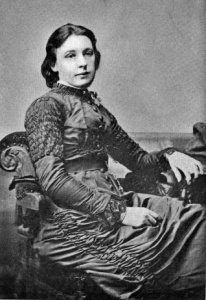
However her work did receive positive reviews in many newspapers and among leading figures. Most notably future Prime Minister William Gladstone, whom she sent a copy to not long after she had witnessed him speak at the Dalkeith Corn Exchange during his Midlothian Campaign. Annie would shortly receive a written letter to her home in Gorebridge written on the 16th of April 1883 which exclaimed the read as ‘beautiful as a work of art’ describing Miss Nesbit and Marget (two of the works protagonists) as ‘truly living sketches of Scottish character’. Swan would remain in touch with Gladstone – receiving admission into the House of Commons on many an occasion – perhaps sparking her interest in political ideas and movements. The entire copyright of Aldersyde made Swan fifty pounds. Considering its success, the sum was not a substantial amount – however the work represented something more to the new author. She recognises, in her biography that it represented a serious, concerted introduction into the world of letters. Quickly followed by Carlowrie, which saw RSA artist Tom Scott come to Gorebridge to sketch scenes for the work, both novels were probably her most successful independent works, which would only be eclipsed by the reputation she developed as a serial writer for the People’s Friend and ‘agony aunt’ for Woman at Home Magazine.
Serial Writings and the ‘Agony Aunt’
Throughout her life, Annie was best recognised and known for her widely read serial publications. From penning replies to concerned housewives to engaging the imagination of the English speaking world, it was through the ever evolving daily, and weekly, publications that Annie Swan would really become a household name. Her reputation was firmly cemented through her work for the People’s Friend; based in Dundee and created in 1869 , which ran with the tagline ‘The Famous Story Magazine’. Annie would write for the magazine until her death in 1942 – leaving her final serial unfinished, a difficulty which the magazine circumvented by getting her readership to write in with possible conclusions.
The power of the serial medium, and Annie’s story writing is perhaps best understood through a letter written into the publication from an avid reader. The reader reminisced how she would visit her gran in a working class, Scottish tenement block, when, one evening, there was a loud banging upon her door. Her granny opened it to find her neighbour from across the hall in a ‘dreadful state’: ‘”Terrible news! Jeanie’s broken off the engagement!” she wailed. Granny sat her down at the kitchen table and pressed her hands tightly. “Calm yourself hen. It’s only a story!”
Showing the captivation with which she held her audience, Annie’s work would, predominantly leave her reader with a happy ending. Annie would often be criticised by her contemporaries for the ‘happy ending’ which would usually conclude (most) of her work. However, Annie was quick to assert that she was content that her work would act as an escape and release from the often difficult and drudging lives of her readership:
The world is so full of a “number of things,” many of them sad, that it does not want its burden added to by the woes of a lot of imaginary people.
While true, she would recognise that, due to the demand for a happy ending and her willingness to provide it, that her work was ‘of course not art, nor even true to life, in which they are so many loose end.’ Going further to argue that
There is a pathetic side to the almost universal demand for a happy ending’.
One such serialisation which sheds light on Annie’s writing style was the popular ‘The Bonnie Jeanie’. Throughout, while appeasing the demand for kailyard Scottish fiction, Swan explores ideas of religion, the role of the housewife, the role of the husband as provider, as well as temperance ideals.
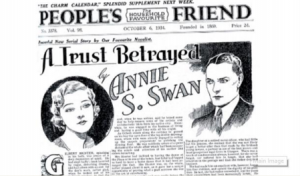
It tells the tale of a drunkard father, detached from his wife Jean Rintoul and her son – who endeavours to lead a life of temperance due to his father’s poor choices. Consider the following passage as an indication of Swan’s ideal: ‘…when folks drink whusky, grandfaither, they never hae a guid hoose, nor claes, nor meat like ither folk.’ This idea continues throughout the story, until, upon its happy conclusion, Jean’s husband swears of drink, pulling the family out of its poverty stricken state. It can be clear from such writing then that Annie’s political outlook and penchant for the political sphere was in many ways tied up with her work which could be argued as tales of morals and Christian values. Furthermore, while an outspoken advocate and supporter of the suffragette movement both before and after the First World War, Annie was also a keen promoter of the ‘domesticated housewife’.
This is perhaps best seen in her agony aunt column for Woman at Home Magazine which in fact became colloquially known as the ‘Annie Swan Magazine’ – an indication of the popularity of her section. In the column, titled ‘Over the teacups’, Annie answered the written concerns and fears of her readership advising, and welcoming reader advice, as to the best solution of many predicaments. Such columns, while large in numbers, included the titles ‘Life and Work at Home,’ ‘What to do with our Daughters’ and ‘Love, Courtship and Marriage’ which give a clear indication as to the content of such writings. In fact, Annie was keen to stress throughout her writings that her work schedule (that is being awake before seven to write) allowed her to carry out what she felt were her ‘wifely duties’ throughout the day. Annie’s ideas and overall time at the magazine would be such a success that she would become its editor until she finished writing for the publication in 1917 (probably due to her growing political and war work).
What becomes clear from an elementary reading of Annie’s serial work for magazines and newspapers, is that she was passionate about social and current affairs, regularly mixing these with her fiction and addressing them through her reader queries. This acts as yet another indication of the intertwining of the multi-faceted aspects to Annie’s life and the extent to which her ideas, and medium, continued to influence swathes of her contemporary public.
War Time Experience
Two wars greatly shaped Annie’s political and social outlook of the world. Firstly, the Boer War, which unfolded during her early days in London, both inspired one of her greatest and most devoured fictions, but also raised moral and ethical questions in her evolving psyche. Secondly, and most critically, the impact of the Great War, and Annie’s role both at home and abroad within the ‘war effort’. ‘Of the Boer War, which unfolded as Annie lived in London, she wrote:
There was neither glory nor glamour about that surrender or that victory. But is there ever in any war? Surely all the false glitter which once surrounded it has been exploded for ever!
In fact, she goes further in her exasperation at not only the war, but the lack of knowledge, discourse and understanding of it at home.
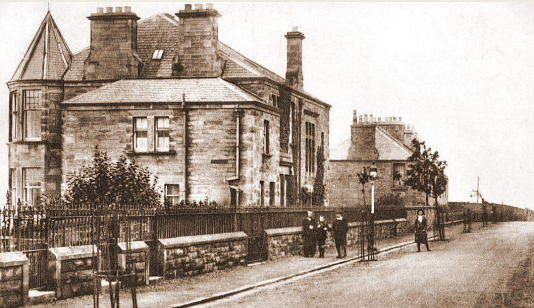
Upon riding the London underground, she was both amazed and horrified to turn to a fellow passenger, ask her of her opinions of the carnage unfolding at Magersfontein, for the woman to reply ‘What war? I didn’t know there was a war.’ During this time, possibly as a remedy for what she perceived as the apathy at Britain, she began a highly successful and critically acclaimed series of short stories in the British Weekly which garnered considerable interest and debate.
Writing under a male pseudonym, it was later reported back to Annie that it had been presumed amongst the Glasgow Literary Society, and others, that they must have been written by either a war time journalist or a member of the armed forces stationed there. She would answer to such presumptions that she was an avid reader of war correspondences, studied maps of the area vigorously, and let her ‘imagination do the rest’.
It would not be until the outbreak of the First World War that Annie would make a tangible contribution to the mechanics of British war affairs. By this time Annie had come to reside at Kinghorn, Fife, where her house and local community succumbed to war fervour due to the importance of its location on the Forth. However her first involvement in the effort came through the YMCA with whom she had already done much work in the munitions factories and home camps before she was sent to the France. Annie’s role in the camps was to speak, at night, to the troops stationed there of the ‘gratitude and encouragement of the women at home’. This role began to evolve and would relate, in kind, to her ‘agony aunt’ role in the weekly magazine. Face to face, she would talk to the soldiers of their ‘mothers, wives, bairns, sweethearts and sisters’, taking down addressing and corresponding with their loved ones when she returned home – until the role became to gargantuan to deal with.
The work did begin to shake Annie, she relates that ‘I found words, beholding in the menfolk, of praying anxious women at home. It was my first introduction to one of the minor horrors of war.’ This horror would be further related to her upon returning home to work with Belgian refugees, prescribing them accommodation, a task she surmised was enough to ‘move even a stoic to tears.’ Throughout this time Annie would continue to give speeches across the country at refugee residences, munitions factories as well as continue to meet her writing contracts.
On the 7th January 1918, Annie’s war time role would take another unexpected turn. She left England after receiving an invitation to go to America on what she describes as ‘a mission for food’, the situation in the United Kingdom having become so desperate. Annie was keen to accept. All of her family at this time, including her daughter Effie, were on active duty and it allowed her what she saw as an escape from ‘the rut of depression’ into which she was gradually sinking. Annie had been told her job was to relate to the American people what had been achieved at home during the war, and impress upon them the urgency with which Britain needed food supplies which they alone could provide. however, upon reaching the States, she was left with little indication, direction or guidance as to how this should be achieved.
Annie, in typical fashion, appealed directly to the heart of America, Capitol Hill, and addressed Herbert Hoover and his entourage at the Government Buildings. This led to her being booked to speak at Food Administrations in many states throughout the country in a Food and Propaganda Campaign which stretched from the Atlantic to the Pacific coast. Throughout, Annie was adored. State administrations thanked her for her impact in inspiring the labour forces, preventing strikes, and relating to them the importance of the labour force in the war effort in Europe and beyond. One correspondence on April 15th 1918 from the Food Administrator of Massachusetts best sheds light on her role and impact: ‘We have a splendid people here in the United States, but we are 3000 miles from the actual war, and it is hard for us to understand the real responsibility which rests upon us… it so happens that in the last seven or eight months I have had over one hundred labour strikes….and if I had you at many of these sessions, my job would have been lightened. Words like yours have tremendous effect at this time.’ Such a story is repeated as Annie crossed the country speaking to audiences large and small, all the while meeting and ‘learning’ from her time there – a time and experience which would largely shape the rest of her life.
In fact, perhaps the best testament to the work she carried out in the United States is best summed up by Hoover himself, a man renowned as being of few words, who was ‘very sorry’ to hear of her later return to the UK and thanking her for her ‘very fine service’.
The 1922 General Election and the Scottish National Party
The war had a great impact on Swan and she had a great impact on it, and in the 1922 general election, Annie Swan’s life would become further entwined within the political sphere – a sphere out of which she would never return. Describing the circumstances which surrounded her inducement to stand as ‘some strange concatenation’, Swan was pitted against a surging Labour Party in Glasgow’s deprived Maryhill division. From the outset, she was very aware of the difficult political environment into which she had been thrust – reflecting that she stood not an ‘earthly chance’ of becoming a member of parliament, yet grateful that her experience was more favourable than fellow female, liberal candidate Helen Fraser. Polling at 3,617 of the popular vote, there were a number of factors which contributed to her somewhat meagre ratings. Firstly, as Swan herself recognises, she had ‘never pretended to be a politician’.
While influenced and interested by Liberal ideas in the wider, more broad sense; party politics and politicking had never ‘interest me in the least.’ She reflects, rather uninterestedly, that she, at the time, had an ‘elemental knowledge of politics’, wasn’t ‘ready witted enough for the hecklers’ and, perhaps more seriously in our political climate, she ‘attacked nobody… in that respect I was a poor candidate.’ Indeed, winner of the division James Muir would attribute his success to ‘thirty years of intensive work and training at street corners,’ an indictment into the harsh environment which Annie had been thrust. Furthermore, the contemporary political environment ensured, as the Scotsman reported at the time, a ‘sweeping success’ for the Labour Party. Firstly, the strong Irish Catholic vote in Glasgow, thought to number around 75,000, were, and have been until recently, strongly connected to the labour movement.
Other factors in the working class city such as housing and the ‘Red Clydeside’ movements contributed greatly to the popularity of a party whose stock was on the increase after the harrowing experiences of both the Great War, and civil war in Ireland. Annie does, however, look back fondly upon this period, and the politicisation of her life which followed, with typical poise and colour. She recalls: ‘The campaign had its humours… One afternoon she [her political canvasser and friend ‘Mrs Anton of Kidderminster’] climbed a steep stair to a landing where there were two doors. When she knocked at one, both opened, and two heads appeared. When she explained her errand, number one lady said cheerfully: Oh yes, I’m votin’ for her.” Whereupon number two said truculently: I’m no’ gaunna vote for her.” Great indignation on the part of number one, who immediately threw out this ultimatum: “Weel, if you’re no’ gaun to vote for her, ye can buy yer ain People’s Friend after this.”‘ Such anecdotes are indicative of the appeal and loyalty with which we have come to understand Annie having had, however her continued political life would lead to becoming a part of a movement which continues to appeal to and shape the Scotland we live in to this day – through the founding of the SNP. The Scottish National Party was inaugurated and formed by the consuming of The National Party of Scotland (1928) of which Swan was also a founder, and the Scottish Party (1932) with its first Annual Conference taking place in Granville Street, Glasgow (in what is now part of the Mitchell Library) on 7th April 1934.
Swan writes little of her role in the founding of the party, and so it is difficult to gleam what her opinion would be in modern Scottish political affairs – it is important however to note that the party was not set up with independence as its primary goal but rather to represent Scotland within a British structure. However, Annie’s position as the only female founder shows both the respect with which she was held in the political sphere and the impact she was having on it.
Personal Life and Tragedies
Annie happily and sorrowfully relates her personal life throughout her autobiography and while her public life has been the main focus of this overview, her personal life deserves brief attention. Particularly a number of personal tragedies which befell her and her family. It has already been related that her mother died while Annie was still unknown to the literary world and was the result of an outbreak of Typhoid which her brother had brought home from the Channel Islands. However the real tragedy of her life would be the death of her young son Edward Burnett Smith in 1910 aged only 15.
Edward’s death is a tragic accident of unspeakable proportions. About to return to Rugby College, Eton for the new school term where he had been for a year, the only son was packing his bags for his stay until Christmas, Annie then takes up the story: ‘He had put his golf sticks in his bag, and at the last tried to push in a small rifle his father had brought him from America. Apparently a charge had been left in it. From the hall there reached me in the drawing room a sudden sharp report. I rushed out, to find him lying face downwards on the rug. He only lived half an hour.’ Annie, who adopts the words of the biblical figure Job that her ‘purposes are broken off’ tells of how it was her strength that managed to pull the family through the tragedy. Her husband, she relates, was utterly broken by the death of his only son, her daughter distraught at
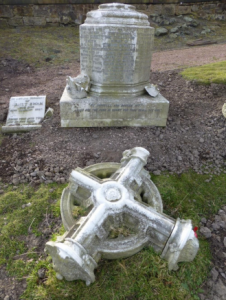
the loss of her younger brother. She discusses the close bond which father and son shared, the viewing his father as the ‘buttress of the universe.’ He would be buried at Kinghorn, Fife, in the grave which now holds Annie and her husband.
Annie’s other child, Effie, played a similar role to Annie in the war with the Red Cross. Working in France and Belgium as a motivational speaker and campaigner, relating the stories and worries of concerned wives and children from home. A lucky escape befell her when she was knocked down by a French military vehicle, only a month after her father had a lucky escape on a sunken ship off the coast of Italy. Of her husband Annie would have a long and trying relationship.
A case study for much of her writing and agony aunt features, she describes her relationship best:
In our case, though we started young and fair, well equipped with love and faith and a common determination to make a success of our dual life, we had various handicaps to contend with. We were both strong characters, holding definite opinions about most things, seeing life from entirely different angles, moreover we had both quick and fiery tempers. Disciplinary measures are necessary for the control of these conflicting handicaps, and only love is capable of contributing the dynamic force. We had sufficient to carry us through.’
James died in May 1927 after a prolonged illness, leaving Annie a widow for 13 years in an episode which she describes as when ‘the clouds began to gather again’. For the remainder of her life, Annie would stay at the family home in Kinghorn, still deeply driven by her writing and her daughter. Annie would die of heart disease in 1943, leaving her last work unfinished.
Conclusion
Annie would reflect upon her lives work and assert:
‘I do not feel any particular thrill of pride when I gaze upon them on the shelves. They have served their purpose, and as none of them is likely to prove immortal, their number is a matter of no importance.’
Such a dismissive appraisal of her lives effort is largely indicative of her scant appraisal in the modern day. Hopefully through this basic introduction to Swan, it becomes clear what a vital historical and literary figure she was. Her multi-faceted life experience tell us much about different elements of the late nineteenth and early twentieth century society. From her importance in the development of literature and evolving media, her important role in the war effort and its representative visualisation of the work carried out by woman throughout the war, her political career, her role as a forefather of the ‘agony aunt’ feature which became so commonplace in the 20th century, Annie Swan is a name which deserves much further critical study and acclaim. Her importance is perhaps summed up by her chance meeting with one elderly lady in Glasgow, not long before her death, who pleaded: ‘Ye canna die yet, for we canna dae without you.’
This article was written by Gorebridge Community Development Trust archivist Sean Watson. It is available as a pdf by clicking here.





